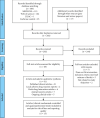Carica papaya L. Leaf: A Systematic Scoping Review on Biological Safety and Herb-Drug Interactions
- PMID: 34040647
- PMCID: PMC8121580
- DOI: 10.1155/2021/5511221
Carica papaya L. Leaf: A Systematic Scoping Review on Biological Safety and Herb-Drug Interactions
Abstract
Introduction: The Carica papaya L. leaf is gaining interest as a potential therapeutic agent for alleviating dengue- and non-dengue-associated thrombocytopaenia. In that regard, safety considerations are as important as efficacy potential. The safety evaluation of botanical products for human use is complicated by variable formulations, complex phytochemical composition, and extrinsic toxicants. This review aimed to systematically collate related safety clinical and preclinical data, as well as reports on herb-drug interactions of C. papaya leaf consumption.
Methods: A systematic search using predetermined keywords on electronic databases (MEDLINE, Cochrane Library Central, LILACS, and Web of Science) and grey literature was conducted. Relevant clinical and preclinical studies were identified, screened, and analysed to present an overall safety profile of C. papaya leaf consumption.
Results: A total of 41 articles were included (23 clinical, 5 ongoing trials, and 13 preclinical) for descriptive analysis on study characteristics, adverse reactions, toxicity findings, and herb-drug interactions, from which 13 randomised controlled and quasiexperimental trials were further assessed for risk of bias and reporting quality. Overall, C. papaya leaf consumption (in the form of juice and standardised aqueous extract) was well tolerated by adult humans for short durations (<five days) while one randomised controlled trial reported safe consumption of C. papaya leaf standardised aqueous extract in children (aged 1-12 years). Minor gastrointestinal side effects were most commonly reported. There are concerns about hepatotoxicity and reproductive toxicity in long-term use, supported by animal studies. Unfavourable herb-drug interactions with metformin, glimepiride, digoxin, ciprofloxacin, and artemisinin were accounted.
Conclusion: C. papaya leaf consumption in adults is generally safe for short-term use though cautioned in pregnancy and people with liver impairment. It has potential herb-drug interactions with oral hypoglycaemic agents, p-glycoprotein substrates, and antibiotics with cation chelating properties.
Copyright © 2021 X. Y. Lim et al.
Conflict of interest statement
The authors declare that there are no conflicts of interest regarding the publication of this paper.
Figures



References
-
- Aravind G., Bhowmik D., Duraivel S., Harish G. Traditional and medicinal uses of Carica papaya. Journal of Medicinal Plants Studies. 2013;1:7–15.
-
- Ong H. C., Zuki R. M., Milow P. Traditional knowledge of medicinal plants among the Malay villagers in Kampung Mak Kemas, Terengganu, Malaysia. Studies on Ethno-Medicine. 2011;5(3):175–185.
-
- Ong H. C., Norzalina J. Malay herbal medicine in Gemencheh, Negri Sembilan, Malaysia. Fitoterapia. 1999;70(1):10–14.
-
- Sundarmurthy D., Jayanthi R., Kuntegowdanahalli L. Effect of Carica papaya leaf extract on platelet count in chemotherapy-induced thrombocytopenic patients: a preliminary study. National Journal of Physiology, Pharmacy and Pharmacology. 2017;7:p. 1.
Publication types
LinkOut - more resources
Full Text Sources
Other Literature Sources

